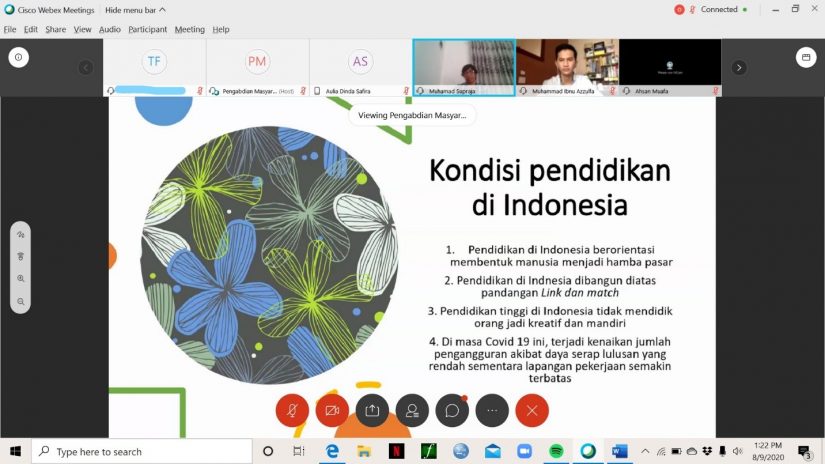
Yogyakarta, 9 August 2020 – Responding to the ongoing online classes, the community service division of Keluarga Mahasiswa Sosiologi collaborated with Social Research Center/SOREC Fisipol UGM in organizing a webinar themed “Online Classes, Is It Effective?”. Three speakers from different fields of expertise delivered their insights: Dr. Muhammad Supraja, S. Sos., S.H., M.Si. as a lecturer in the Department of Sociology Fisipol UGM; Fauzi Ahmad, a volunteer for Yogyakarta Mengajar; and R. Rudi Pramono, S. IP., M. Si. as the head of Seyegan district representing the government. Moderated by Muhammad Ibnu Azzulfa—a student in Department of Sociology UGM—the discussion successfully gathered 160 people on Webex.
Dr. Arie Sudjito as the head of Department of Sociology gave his opening speech to commence the event. In brief, he summarized the advantages and downsides of online lectures. He reckoned that both offline and online classes had their own plus and minuses. In the middle of the pandemic, educational institutions were expected to pick the right formula of online classes so as to not burden students and lecturers.
The first speaker, Dr. Muhammad Supraja, opened the discussion by elaborating on current conditions of education in Indonesia. He pointed out that, as education was built on the foundation of link-and-match principles, the current system revolved around shaping individuals to fit the market’s needs. However, such a system faced difficulties in the wake of COVID-19 spread as the circumstances limited job vacancies, hence boosting numbers of unemployed individuals. He also emphasized how educational institutions shift to all-online activities, as well as health protocol-bound physical activities.
He added that a handful of problems occurring in online classes required extra attention: uneven infrastructure, signal issues, and limited access to e-learning. Sudden transition to online platforms also produced adverse socio-cultural impact, such as ineffective learning and swollen budget for infrastructure provision.
Fauzi Ahmad took over the baton and began his presentation by introducing his community, Yogyakarta Mengajar. Throughout its entire six years, the community utilized online platforms to fight for educational causes, be it through organizing webinars, publishing learning materials via Instagram, and also distributing charity funds to beneficiaries. Amidst the pandemic, Fauzi added, actors in the education scene had the time to reflect on how education worked during distance learning. To illustrate further, Fauzi quoted Ki Hajar Dewantara, “Every one can be a teacher and every home can be a school”.
The last session, delivered by R. Rudi Pramono, revolved around the discussion of online learning ineffectiveness. He claimed that laboratory-based learning was impeded and skill/knowledge transfer was hindered. Knowledge transfer, he remarked, required direct interaction to transfer necessary skills and help shape student behavior. To optimize the outcomes of online learning, he introduced the term Adaptasi Kebiasaan Baru/AKB—dliterally meaning new customs adaptation—which was highly necessary during these times. To strengthen synergy, Rudi believed every stakeholder—the government, unviersities, and students—need to be prepared. “Presence of the society in social control plays key role in this situation,” he remarked.
